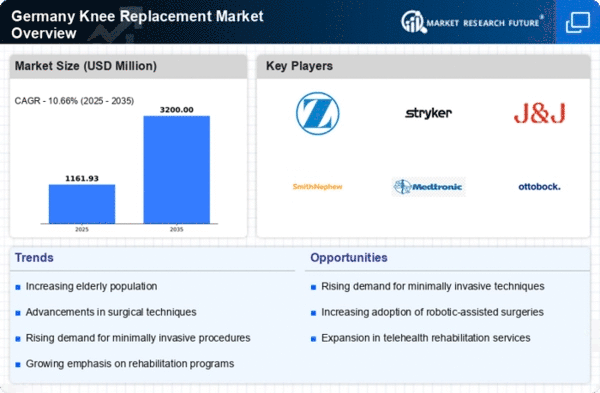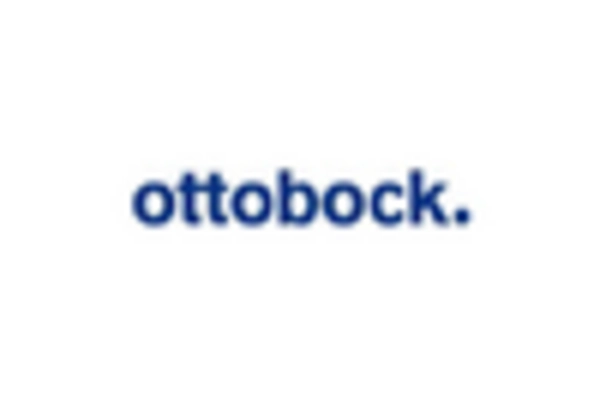Increased Healthcare Expenditure
Germany's commitment to healthcare spending significantly influences the knee replacement market. The government allocates a substantial portion of its budget to healthcare, with expenditures reaching approximately 11.7% of GDP. This financial support facilitates access to advanced medical technologies and surgical procedures, including knee replacements. As healthcare facilities invest in state-of-the-art equipment and training for medical professionals, the quality of care improves, attracting more patients to seek knee replacement surgeries. The knee replacement market benefits from this trend, as increased funding allows for the adoption of innovative solutions that enhance surgical outcomes and patient satisfaction. Consequently, the market is likely to experience sustained growth as healthcare investments continue to rise.
Supportive Regulatory Environment
The regulatory framework in Germany plays a crucial role in shaping the knee replacement market. The government has established guidelines that promote the safe and effective use of medical devices, including knee implants. This supportive environment encourages manufacturers to innovate and bring new products to market, fostering competition and improving patient choices. Additionally, the reimbursement policies in place ensure that patients have access to necessary surgical procedures without prohibitive costs. The knee replacement market is likely to thrive under these favorable conditions, as regulatory support facilitates the introduction of advanced technologies and enhances overall market dynamics. As regulations continue to evolve, the market may experience further growth opportunities.
Rising Incidence of Knee Disorders
The increasing prevalence of knee disorders in Germany is a primary driver for the knee replacement market. Conditions such as osteoarthritis and rheumatoid arthritis are becoming more common, particularly among the aging population. According to recent health statistics, approximately 10 million individuals in Germany suffer from osteoarthritis, leading to a heightened demand for knee replacement surgeries. This trend is expected to continue, as the population ages and lifestyle factors contribute to joint deterioration. The knee replacement market is thus positioned to grow, as healthcare providers seek to address the needs of patients requiring surgical intervention. Furthermore, advancements in surgical techniques and implant technologies are likely to enhance patient outcomes, further driving the market's expansion.
Technological Innovations in Implants
Technological advancements in knee implants are transforming the landscape of the knee replacement market. Innovations such as 3D printing and personalized implants are gaining traction in Germany, allowing for customized solutions that cater to individual patient needs. These advancements not only improve surgical outcomes but also enhance the longevity of implants, reducing the need for revision surgeries. The knee replacement market is likely to benefit from these innovations, as they attract patients seeking the latest treatment options. Furthermore, the integration of smart technologies in implants may provide real-time data on patient recovery, further enhancing the appeal of knee replacement procedures. As these technologies evolve, the market is expected to expand significantly.
Growing Awareness of Treatment Options
There is a notable increase in awareness regarding treatment options for knee disorders among the German population. Educational campaigns and improved access to information have empowered patients to seek medical advice sooner. This shift in patient behavior is driving demand for knee replacement surgeries, as individuals become more informed about the benefits and risks associated with the procedure. The knee replacement market is responding to this trend by enhancing patient education initiatives and providing comprehensive resources. As patients become more proactive in managing their health, the likelihood of opting for knee replacement surgery increases, thereby contributing to market growth. This trend suggests a potential for further expansion as awareness continues to rise.
















